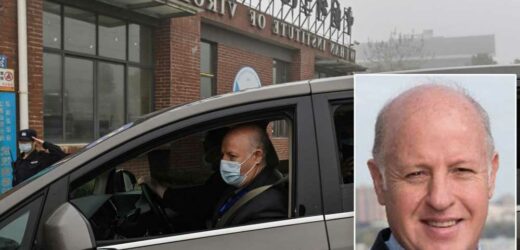More On:
Coronavirus
Biden to miss two major COVID-19 goals
Tokyo Olympics to allow up to 10K domestic fans at each event
Vaccine hesitancy puts India’s gains against COVID-19 at risk
Indonesia records largest single-day jump in COVID infections
The head of a New York City-based nonprofit that directed hundreds of thousands of dollars in federal grant money to the Wuhan Institute of Virology is no longer part of a UN-backed commission examining the origins of the coronavirus pandemic.
EcoHealth Alliance President Peter Daszak’s profile on the website of The Lancet COVID-19 Commission has been updated to include the parenthetical quote “recused from Commission work on the origins of the pandemic.” The Daily Mail first reported on Dazak’s recusal Monday.
Earlier this month, Vanity Fair reported that Dazsak helped organize a statement signed by 27 leading scientists that appeared in The Lancet — a prestigious British medical journal — in February 2020. The statement condemned what it called “conspiracy theories suggesting that COVID-19 does not have a natural origin” and proclaimed “solidarity with all scientists and health professionals in China.”
“Conspiracy theories do nothing but create fear, rumours [sic], and prejudice that jeopardise [sic] our global collaboration in the fight against this virus,” the statement added.
Though the statement initially claimed that the signatories had “no competing interests,” The Lancet issued a statement on Monday saying it had invited all 27 signatories (at least one of whom has walked back his support of the natural, or zoonotic theory) to “re-evaluate their competing interests.” The statement included an updated disclosure from Daszak attached to the February 2020 statement and two other pieces he co-authored or contributed to.
In his expanded disclosure, Daszak stated that EcoHealth’s work in China — including at the Wuhan lab — was funded by the National Institutes of Health (NIH) and the US Agency for International Development (USAID). Daszak also denied that he or EcoHealth received money directly from the Chinese government.
“EcoHealth Alliance’s work in China … includes the production of a small number of recombinant bat coronaviruses to analyse [sic] cell entry and other characteristics of bat coronaviruses for which only the genetic sequences are available,” he wrote. “NIH reviewed the planned recombinant virus work and deemed it does not meet the criteria that would warrant further specific review by its Potential Pandemic Pathogen Care and Oversight (P3CO) committee.”
The belated disclosure from The Lancet comes months after the nonprofit group US Right to Know reported that four of the statement’s co-authors had direct ties to EcoHealth Alliance. The Vanity Fair report stated that six signatories had either worked at EcoHealth Alliance or received funding from it.
Two months after The Lancet statement was published, Daszak emailed National Institute for Allergy and Infectious Diseases Director Dr. Anthony Fauci thanking him for supporting the theory that coronavirus naturally jumped from animals to humans and did not leak out of the Wuhan lab.
“I just wanted to say a personal thank you on behalf of our staff and collaborators, for publicly standing up and stating that the scientific evidence supports a natural origin for COVID-19 from a bat-to-human spillover, not a lab release from the Wuhan Institute of Virology,” Daszak wrote on April 18, 2020. “From my perspective, your comments are brave, and coming from your trusted voice, will help dispel the myths being spun around the virus’s origins.”
“Many thanks for your kind note,” replied Fauci, who had been told by another email correspondent in late January that the coronavirus may have been “engineered”.
The so-called “lab leak” theory, once dismissed by the mainstream media, has gained traction in recent weeks after a series of revelations — most notably that three researchers at the Wuhan lab were hospitalized with possible COVID symptoms in November 2019, the same period when experts believe the virus was spreading through the 11 million-strong city of Wuhan.
Internal NIH emails obtained by the conservative group Judicial Watch earlier this month show that EcoHealth funneled more than $825,000 in grant money to the Wuhan Institute of Virology over a six-year period ending in fiscal year 2019. In total, the Wuhan lab was to receive $1.5 million between fiscal year 2014 and fiscal year 2025 for its work on bat coronaviruses before the grant was terminated by NIH in April of last year.
Daszak has also been scrutinized over his role as the sole US representative on a World Health Organization (WHO) fact-finding mission to Wuhan earlier this year. That trip produced a report that said the virus likely emerged from animals and was panned by governments around the world, as well as the WHO’s own director general.
Despite his position at the center of the scientific response to the pandemic, Daszak has repeatedly declined to speak to reporters or lawmakers about EcoHealth, the initial WHO investigation, his relationship with Fauci, the Wuhan Institute of Virology or other issues.
Share this article:
Source: Read Full Article





